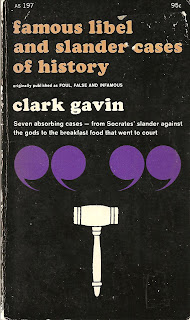
A Democratic Right Of Speech
By W. Powell -
This little booklet details seven famous libel and slander cases throughout history, beginning with Socrates. The writing gets a bit litigous at times, but anyone with the equivalent of a high school diploma can follow the cases.
This book is important in that it shows us how thankful we should be to those in the past who sacrificed themselves in courts of law so that future generations could enjoy freedoms of expression in a free democratic society. While reading the case of libel against Thomas Cooper I was made aware of the Amercian Sedition Act of 1798 and the alien laws of that period.
Mr. Cooper, newspaper editor, politician and scientist, took a stand against charges of libel for printing articles thought damaging to then president of the United States, John Adams. Mr. Cooper's decision to fight the charges of libel was not because he wasn't guilty under the law, but that he felt any law making it criminal to question the capacity of a President to carry out his functions as commander in chief, was a tyrannical law in a democracy.
Did you know that in 1800 you could be fined and jailed for saying or printing anything that put the President of the U.S. in a bad light? Mr. Cooper knew this and yet and still he challenged the law that forbid his right to say and print what he felt was the public's right to know.
This book reminds me of a famous quote I once heard somewhere: "I may disagree with what you say, but I will defend to the death your right to say it."
Know Your First Amendment Rights and Those Who Defended it.
First Collier Books Edition 1962 (paperback)
This book is important in that it shows us how thankful we should be to those in the past who sacrificed themselves in courts of law so that future generations could enjoy freedoms of expression in a free democratic society. While reading the case of libel against Thomas Cooper I was made aware of the Amercian Sedition Act of 1798 and the alien laws of that period.
Mr. Cooper, newspaper editor, politician and scientist, took a stand against charges of libel for printing articles thought damaging to then president of the United States, John Adams. Mr. Cooper's decision to fight the charges of libel was not because he wasn't guilty under the law, but that he felt any law making it criminal to question the capacity of a President to carry out his functions as commander in chief, was a tyrannical law in a democracy.
Did you know that in 1800 you could be fined and jailed for saying or printing anything that put the President of the U.S. in a bad light? Mr. Cooper knew this and yet and still he challenged the law that forbid his right to say and print what he felt was the public's right to know.
This book reminds me of a famous quote I once heard somewhere: "I may disagree with what you say, but I will defend to the death your right to say it."
Know Your First Amendment Rights and Those Who Defended it.
First Collier Books Edition 1962 (paperback)